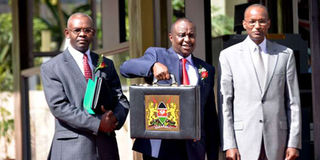Parliament faults 2017 budget policy statement

From left, National Treasury Principal Secretary Kamau Thuge, Cabinet Secretary Henry Rotich and Central Bank of Kenya Governor Patrick Njoroge at Treasury Building before going to Parliament Buildings to present the Budget for 2016/2017 on June 8, 2016. PHOTO | SALATON NJAU | NATION MEDIA GROUP
What you need to know:
- The budget and economic experts said the budget policy statement appears to have been submitted merely to fulfil the requirements of the law.
- Parliamentary Budget Office doubts the Treasury’s assertions regarding the proposed allocation of Sh334.9 billion to counties for the 2017/18 financial year.
- The Treasury has pointed out that the total ordinary revenue is Sh1.549 trillion, while the shareable is Sh1.538 trillion.
- In allocating the counties Sh334.9 billion, the Treasury also appeared to have ignored inflation.
Parliamentary experts on budgeting have criticised the Treasury’s plans for next year’s budget submitted to the Senate and the National Assembly last week.
In an analysis submitted to the Senate’s Finance Committee, the Parliamentary Budget Office pointed out missing information and said the next budget will not be policy-driven.
The budget and economic experts, who advise legislators as they scrutinise the budget, said the budget policy statement appears to have been submitted merely to fulfil the requirements of the law.
The statement is now under scrutiny by the committees before adjustments are made and limits set on what each sector and arm of government can get.
PBO says that if MPs adopt the business-as-usual approach and approve the policy statement as it is, public debt will continue to increase and issues routinely raised by auditors will continue.
The other option is for MPs to adjust the budget deficit to a manageable level and enable Kenya align its spending with the realities of the times. “The office has noted through review of past budget processes that at least 10 per cent of all resources are wasted through wrong procurement, exaggerated prices among other vices,” said PBO.
REDUCE BUDGETS
It said that based on this, it should be possible to reduce the budgets for each arm of government and each sector, without a harmful effect.
PBO doubts the Treasury’s assertions regarding the proposed allocation of Sh334.9 billion to counties for the 2017/18 financial year.
The Treasury has pointed out that the total ordinary revenue is Sh1.549 trillion, while the shareable is Sh1.538 trillion.
But even this is not credible as the national government has never been able to meet the target for the shareable revenue.
In allocating the counties Sh334.9 billion, the Treasury also appeared to have ignored inflation.
The Treasury has said that the amount of money to be shared by the 47 counties will increase by 6.7 per cent, which PBO said does not consider the current inflation.
“With the current inflation at about 6.5 per cent, the increment for the counties will only cover the changes in prices and thus no benefit of the increased sharable revenue will be enjoyed by the county governments,” said PBO.
This means that whereas the Treasury argues in the PBS that the allocation to the counties would increase by Sh32.7 billion, this increase is not real as it would be wiped out by the increase in prices.
Unlike in previous Budget Policy Statements, the Treasury also failed to disclose its specific targets to be met in the 2017/18 financial year.
“For example, there are no details on measures that will be taken to strengthen revenue collection, eliminate unproductive expenditures, stabilize the Kenyan currency…which means the 2017/18 budget will not be policy-driven,” said PBO.
INCREASE HOUSING UNITS
While Treasury had said that the plan to increase housing units for the police would be expanded to the Kenya Defence Forces and the Prisons Department by 2016, it did not inform MPs of progress on this target.
There was also nothing on the planned establishment of a fund to finance the development of an integrated security system.
Treasury was also mum about the development of guidelines for the installation of surveillance cameras in all urban buildings in collaboration with county governments.
On the infrastructure front, Treasury listed the government’s plan to have 1,138 kilometres of low volume roads, 1,768 kilometres of new roads, 41 footbridges and the rehabilitation of 224 kilometres of other roads.
But it is yet to report on plans regarding the Mass Rapid Transport for the Nairobi Metropolitan region as well as the establishment of an independent body to audit and certify the construction and maintenance of roads.
While the construction of the second phase of the new railway to Naivasha has started, PBO noted, there is no word on the establishment of the industrial parks there that the railway is supposed to serve.
It also failed to update MPs on progress of the 100,000-acre Galana-Kulalu irrigation project.
Treasury has said in the BPS that it plans to continue the upgrade of stadia at Kamariny, Chuka, Karatu-Ndarugu, Marsabit and Wote yet there is no word on the five stadia promised in the Jubilee manifesto and the BPS for the current financial year.





